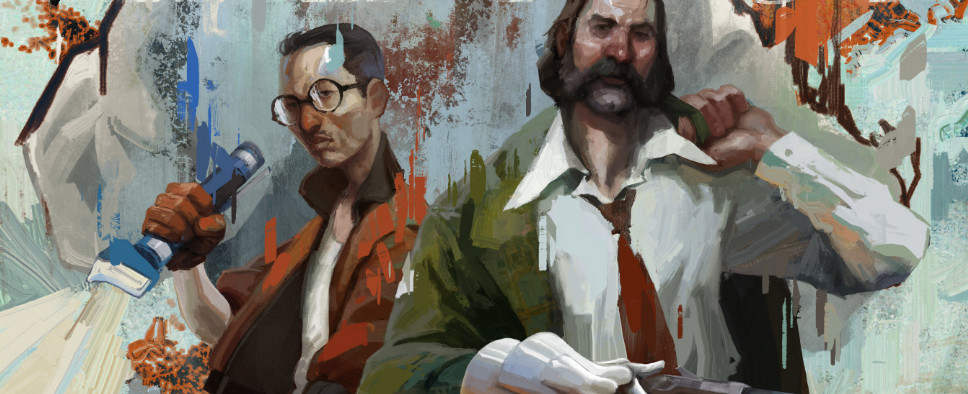Disco Elysium Review - Page 3
-
Category: ReviewsHits: 17427

Article Index
The game is set in a world that's quite similar to our own early 1980s but with numerous differences of varying subtlety. The cars all look funky, there's no television, which makes radio way more prominent, and on the edges of the world there's a mysterious substance known only as the Pale that drives people insane and threatens to at some point completely envelop the world. A setting like this is what people refer to as magical realism. I won't try to explain it to you as I'm no expert on it myself, but in layman's terms imagine if Wes Anderson created a world, Raymond Chandler wrote a story in it, and Hunter S. Thompson edited it. That's Disco Elysium in a nutshell.
This curious world is packed with NPCs that all have one thing in common. They feel deeply and profoundly human. In a game like this it would have been very easy to split the cast between the good guys and the bad guys, assign them appropriate stereotypes and call it a day. Disco Elysium avoids this pitfall and gives pretty much every character a distinct personality with plenty of flaws but a lot to respect as well.
If you dig deep enough, even the characters positioned as antagonists, or bumbling comic relief buffoons, have a reason to be the way they are, which makes it quite difficult to not sympathize with them on some level. And then of course there's Kim Kitsuragi, your new partner who plays the straight man to your cop of the Apocalypse. Ever helpful, Kim has a mind of his own and is always there to ground you in reality or interject in a conversation when he has something to say.
Your best friend while trying to navigate this weave of characters and their problems is your journal. Apart from listing available tasks, it also tracks a series of secondary statistics like the so-called copotype that's determined by your preferred approach to solving cases, the good cop/bad cop meter, and the mysterious Honor points.
The journal also contains the game's take on an alignment system. Instead of Law and Chaos, Disco Elysium has political leanings. And this is one of the few things where I think the game falters narrative-wise. There's already the Union sub-plot that shows off plenty of class struggle, hidden agendas, and nefarious machinations. It's done in a subtle and thought-provoking fashion. Why then, does the game feel the need to turn some of its NPCs into exaggerated poster boys for various fringe ideologies is beyond me.
And on top of that, you will often get dialogue branches that serve no purpose other than to let you express some dumb political opinion and gain some points for your character sheet. Sure, the game doesn't discriminate and makes fun of all available ideologies, but still, more often than not these political chats feel tacked on and completely unnecessary.
Still, while fairly annoying, this is just one minor aspect of an otherwise great game. A game that gets frequently compared to Planescape: Torment. And in a way, I feel that it's an apt comparison. You have your amnesiac protagonist with a mysterious past, an unusual and intriguing world filled with colorful characters, and then there's of course the high baseline level of writing. It all feels faintly familiar but at the same time fresh and not at all derivative.
What can change the nature of a man? You'll be pondering this age-old question while trying to figure out what put your protagonist into that hotel room. The game doesn't answer this question. It intentionally leaves things ambiguous. It provides you with a few possible explanations and lets you choose one for yourself. And seeing how I'm still thinking about this, days after I finished the game, the developers must have done something right.
The Expression
Had I been more knowledgeable about all the different art styles and their practical applications, I probably could have told you all about Disco Elysium's visuals and the inspirations behind them. As is, all I can say is that the game oozes style and is an absolute joy to look at. Character models may be a bit too basic, but they fit the game's world and have a certain unmistakable charm to them.
The game's soundtrack was composed by British Sea Power. It's an indie rock band, apparently. I've never heard of them before playing Disco Elysium, but they do have a detailed Wikipedia page and a healthy number of albums. What's more important is that even though their music is not at all my cup of tea, the stuff they've put together for the game is simply outstanding.
Voice acting, on the other hand, can be a bit uneven. Some of the characters, you can't get enough of and just want them to never stop talking. Others sound perpetually tired, like their actors are just mumbling their lines into cheap microphones in some basement somewhere. Thankfully, the limited nature of Disco Elysium's voice acting means that the bad parts don't get enough screen time to get properly grating.

